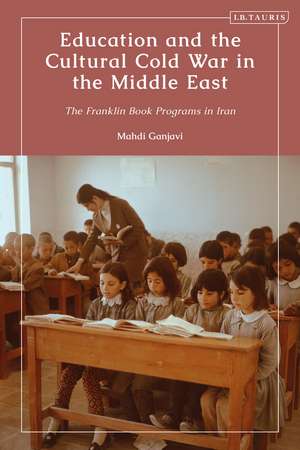Education and the Cultural Cold War in the Middle East: The Franklin Book Programs in Iran
Autor Mahdi Ganjavien Limba Engleză Paperback – 21 aug 2024
| Toate formatele și edițiile | Preț | Express |
|---|---|---|
| Paperback (1) | 190.50 lei 3-5 săpt. | |
| Bloomsbury Publishing – 21 aug 2024 | 190.50 lei 3-5 săpt. | |
| Hardback (1) | 509.76 lei 6-8 săpt. | |
| Bloomsbury Publishing – 22 feb 2023 | 509.76 lei 6-8 săpt. |
Preț: 190.50 lei
Preț vechi: 248.91 lei
-23% Nou
Puncte Express: 286
Preț estimativ în valută:
36.45€ • 38.06$ • 30.17£
36.45€ • 38.06$ • 30.17£
Carte disponibilă
Livrare economică 14-28 martie
Preluare comenzi: 021 569.72.76
Specificații
ISBN-13: 9780755643462
ISBN-10: 0755643461
Pagini: 208
Dimensiuni: 156 x 234 x 25 mm
Greutate: 0.3 kg
Editura: Bloomsbury Publishing
Colecția I.B.Tauris
Locul publicării:London, United Kingdom
ISBN-10: 0755643461
Pagini: 208
Dimensiuni: 156 x 234 x 25 mm
Greutate: 0.3 kg
Editura: Bloomsbury Publishing
Colecția I.B.Tauris
Locul publicării:London, United Kingdom
Caracteristici
Reveals extent of FBP's operations in Iran, where it was most "successful" and affiliated with many projects involving Iran's Ministry of Education
Notă biografică
Mahdi Ganjavi holds a PhD from the University of Toronto, Canada. Ganjavi's scholarly writings, essays, and reviews have appeared in the International Journal of Lifelong Education, Encyclopedia Iranica, Iranian Studies, Ajam Media, the Bullet, Global Voices, and the Review of Middle East Studies.
Cuprins
AcknowledgmentsA Note on TransliterationList of Abbreviations 1. A Cold War History of Books and Education2. Cultural Imperialism: Why Franklin Book Programs Matters3. Franklin Book Programs: Translation, Publications, and Book Distribution during the Cold War4. History and International Evolution of the Franklin Book Programs (1952-77)5. Franklin Book Programs in Iran: Context, Establishment, and Regular Translation Programs6. Franklin Book Programs in Iran: Special Educational Projects, Reactions to the Tehran Branch, and Demise7. The Cold War, Knowledge Production, and the Middle East Appendix I: The Presidents of the FBP and a List of FBP Local BranchesAppendix II: Local Participation by Civic and Intellectual LeadersReferences
Recenzii
Ganjavi's meticulously researched and compellingly argued new book fills a crucial gap in our understanding of the "Cultural Cold War" as it powerfully scrutinises the decisive role of US soft power and cultural hegemony in the production and reproduction of the imperial mode of living. Moreover, its penetrating and laser-focused exploration of the vicissitudes of the Franklin Book Program are without parallel and prove indispensable to anyone wishing to ascertain a solid grasp of Iran's recent intellectual history.
In a moment where the politics of education, books, and libraries are deeply contested, Ganjavi's book provides an expansive account of The Franklin Book Programs in Iran. His sharp and sobering analysis provides a critical new understanding of the significance of education in the complex geopolitics of the Middle East during the Cold War. Ganjavi, through his meticulous archival research, unveils the less visible workings of US imperialism manifested through the complex networks and organizational structures that supported the translation of educational materials in the Franking Book Programs. For historians, activists, and others interested in Iran's past, present, or future - this is mandatory reading.
In a moment where the politics of education, books, and libraries are deeply contested, Ganjavi's book provides an expansive account of The Franklin Book Programs in Iran. His sharp and sobering analysis provides a critical new understanding of the significance of education in the complex geopolitics of the Middle East during the Cold War. Ganjavi, through his meticulous archival research, unveils the less visible workings of US imperialism manifested through the complex networks and organizational structures that supported the translation of educational materials in the Franking Book Programs. For historians, activists, and others interested in Iran's past, present, or future - this is mandatory reading.
